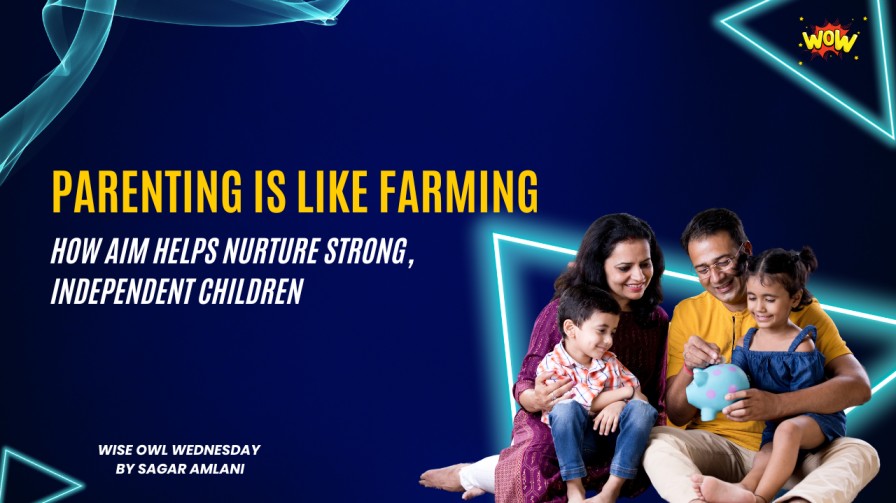The Story: The evolving challenges of parenting across different life stages.
The Turning Point: Understanding that parenting is about nurturing, not controlling.
Action: Applying the AIM framework—Awareness, Investment, and Motivation—to each phase.
Results & Reflection: How shifting perspectives can create deeper parent-child relationships.
THE STORY - PARENTING IS LIKE FARMING
Parenting is not about control—it’s about creating the right conditions for growth.
Think of it like farming:
🌞 Sunlight (Values): The principles and ethics you instill in your child.
🌱 Fertile Soil (Culture): The environment, traditions, and habits you cultivate at home.
💧 Water (Love & Care): The emotional and physical nourishment you provide.
After that, you must trust nature to unfold the magic.
Yet, every stage of parenting brings different challenges—just like how different plants need different care.
Let’s explore how Awareness, Investment, and Motivation (AIM) can help parents through three key stages: Infants, Teenagers, and Adults.
STAGE 1: PARENTS OF INFANTS - NURTURING THE SEEDLING
This stage is all about providing a safe and nurturing foundation while embracing patience.
🌞 Awareness:
Understanding that infants don’t need perfection, they need presence.
Recognizing early emotional and cognitive development cues.
Letting go of comparisons—every child grows at their own pace.
💧 Investment:
Spending quality time (talking, reading, and skin-to-skin bonding).
Creating a loving and stable environment for security.
Learning about early childhood development to respond effectively.
🌱 Motivation:
Finding joy in small moments of growth—a first smile, a tiny hand gripping yours.
Understanding that patience is key—this stage is about planting strong roots.
👉 Your Takeaway: Parenting an infant is about nurturing with love, not rushing milestones.
STAGE 2: PARENTS OF TEENAGER - CULTIVATING INDEPENDENCE
Teenage years are when children stretch their roots—seeking independence while still needing guidance.
🌞 Awareness:
Recognizing that teenagers are not rebelling, they are discovering themselves.
Being mindful of peer pressure, academic stress, and emotional shifts.
Understanding that discipline should evolve from control to communication.
💧 Investment:
Investing in conversations—listening without judgment, asking open-ended questions.
Creating a safe space—letting them make mistakes while being there for support.
Building trust—showing belief in their choices, even when it’s difficult.
🌱 Motivation:
Remembering that connection is more important than correction.
Finding joy in small victories—a random heart-to-heart, a problem they solved on their own.
Staying emotionally available, even when they act distant.
👉 Your Takeaway: Parenting a teenager is about guiding, not controlling. Let them grow while knowing they can always turn to you.
STAGE 3: PARENTS OF ADULTS - LETTING THE TREE STAND TALL
When children become adults, parenting shifts from shaping their life to supporting their journey.
🌞 Awareness:
Accepting that parenting an adult means stepping back, not stepping away.
Understanding that they will have different values, goals, and lifestyles.
Recognizing that advice should be given when asked for, not imposed.
💧 Investment:
Investing in their independence—allowing them to handle challenges on their own.
Building an adult-to-adult relationship, rather than a parent-child dynamic.
Investing in new ways to stay connected—calls, visits, shared experiences.
🌱 Motivation:
Finding joy in watching them create their own life.
Staying available without being overbearing.
Embracing the new phase of life with fulfillment, rather than emptiness.
👉 Your Takeaway: Parenting an adult is about trusting the roots you’ve planted and celebrating their journey.
RESULTS & REFLECTION
A few months later, these parents noticed transformations:
Arjun & Priya (Infant Stage): They stopped worrying about doing everything “perfectly” and started enjoying small moments with their baby.
Ramesh & Anjali (Teenager Stage): They created trust with their son by listening more and controlling less. Their relationship improved.
Sunil & Meera (Adult Child Stage): They embraced their evolving role and found new ways to stay connected with their daughter without overstepping.
The AIM framework didn’t just make them better parents—it made them more fulfilled individuals.
FINAL REFLECTION:
No matter what stage of parenting you’re in:
-
Are you aware of what your child needs at this stage?
-
Are you investing in the right ways—emotionally, mentally, and in their independence?
-
Is your motivation driven by guidance rather than control?
What’s Next?
In the next issue, we’ll explore how AIM can empower Managers to lead with clarity, invest in their teams, and stay motivated in a fast-paced world.
Until then, remember: Parenting is not about control—it’s about connection.



